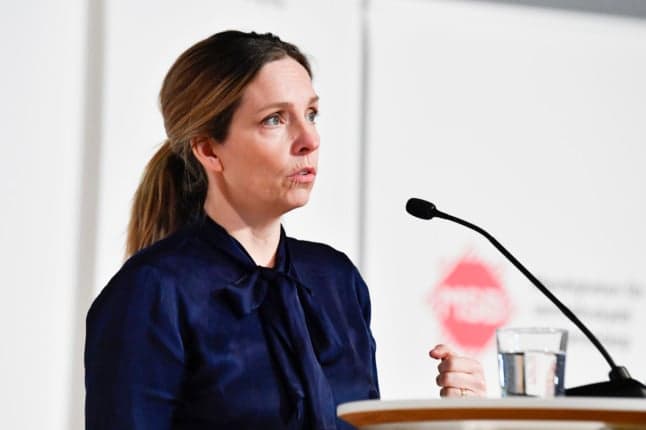30 percent increase in new Covid-19 cases in Sweden in last week

The number of confirmed cases of Covid-19 increased by 30 percent in Sweden over the last week. This increase was especially noticeable in the major cities of Stockholm, Gothenburg and Malmö.
Last week, a record-high number of people in Sweden were tested – more than 380,000, of which 6.4 percent were positive.
"In principle, the spread of infection is increasing in all regions. Especially in the major cities," said Sara Byfors, an expert from the Swedish Public Health Agency, at the health authorities weekly press conference, held on Wednesday instead of Thursday this week.
260 cases of the new Omicron variant of the virus have been confirmed in Sweden in total. There is not a lot of knowledge about the variant yet, but so far there is nothing to suggest that the virus makes people more seriously ill, but it appears to be more infectious.
On Wednesday, 91 Covid-19 patients were being treated in intensive care, with 471 in hospital in other departments. Infection is also increasing in elderly care.
Globally, cases of Covid-19 are slightly decreasing. In Europe, the curve is very flat – in some countries it is increasing, and in some countries it is decreasing.
"Cases are high in many countries now. And that's before Omicron has taken hold in many countries," said Byfors.
"It's also clear that the vaccine is not as effective against becoming infected witth Omicron," she said. The Public Health Agency does, however, believe that the vaccine still protects against serious illness caused by the Omicron variant.
All of the agency's new possible scenarios show infection rates reaching a peak in January.
"We have seen with Omicron that the spread of infection happens extremely quickly, which also leads to increased pressure on healthcare services," said Byfors.
In the agency's worst-case scenario, Sweden will have almost 14,000 cases per day in mid-January. In the middle scenario, 8,000 cases per day, and in the best-case scenario, this number will be 4,000 per day.
According to the National Board of Health and Welfare, pressure on the healthcare system is increasing and will continue to do so until the end of January. Regions must now scale up capacity, said the board's expert Thomas Lindén.
"We believe that capacity has been lower than we believe it should be," he said.
Comments
See Also
Last week, a record-high number of people in Sweden were tested – more than 380,000, of which 6.4 percent were positive.
"In principle, the spread of infection is increasing in all regions. Especially in the major cities," said Sara Byfors, an expert from the Swedish Public Health Agency, at the health authorities weekly press conference, held on Wednesday instead of Thursday this week.
260 cases of the new Omicron variant of the virus have been confirmed in Sweden in total. There is not a lot of knowledge about the variant yet, but so far there is nothing to suggest that the virus makes people more seriously ill, but it appears to be more infectious.
On Wednesday, 91 Covid-19 patients were being treated in intensive care, with 471 in hospital in other departments. Infection is also increasing in elderly care.
Globally, cases of Covid-19 are slightly decreasing. In Europe, the curve is very flat – in some countries it is increasing, and in some countries it is decreasing.
"Cases are high in many countries now. And that's before Omicron has taken hold in many countries," said Byfors.
"It's also clear that the vaccine is not as effective against becoming infected witth Omicron," she said. The Public Health Agency does, however, believe that the vaccine still protects against serious illness caused by the Omicron variant.
All of the agency's new possible scenarios show infection rates reaching a peak in January.
"We have seen with Omicron that the spread of infection happens extremely quickly, which also leads to increased pressure on healthcare services," said Byfors.
In the agency's worst-case scenario, Sweden will have almost 14,000 cases per day in mid-January. In the middle scenario, 8,000 cases per day, and in the best-case scenario, this number will be 4,000 per day.
According to the National Board of Health and Welfare, pressure on the healthcare system is increasing and will continue to do so until the end of January. Regions must now scale up capacity, said the board's expert Thomas Lindén.
"We believe that capacity has been lower than we believe it should be," he said.
Join the conversation in our comments section below. Share your own views and experience and if you have a question or suggestion for our journalists then email us at [email protected].
Please keep comments civil, constructive and on topic – and make sure to read our terms of use before getting involved.
Please log in here to leave a comment.